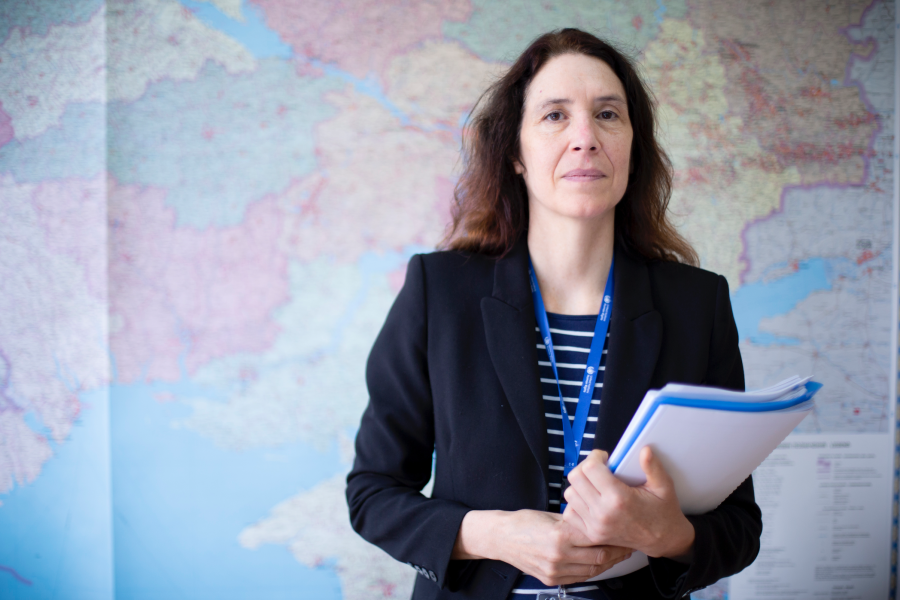New UN report reveals human rights violations perpetrated in the context of criminal cases related to the conflicts in eastern Ukraine and in Crimea
27 August 2020
- According to a new report (1) of the Office of the United Nations High Commissioner for Human Rights (OHCHR) (2) published today, unlawful and arbitrary arrest and detention, protracted trials, lack of access to a lawyer, use of torture and ill-treatment and lack of effective remedy were common human rights violations that occurred during criminal proceedings and processes related to the armed conflicts in eastern Ukraine and in the Autonomous Republic of Crimea, and the city of Sevastopol, temporarily occupied by the Russian Federation (3).
“Over six years, we have been documenting human rights violations in criminal cases in the context of the conflicts in eastern Ukraine and in Crimea. We call on those responsible to end these unlawful practices and ensure respect of the right to a fair trial for all individuals,” said Matilda Bogner, Head of the UN Human Rights Monitoring Mission in Ukraine.

In Government-controlled territory, the report highlights widespread violations of the rights to liberty and security, legal counsel, a fair hearing by a competent, independent and impartial tribunal, trial without undue delay and access to an effective remedy, as well as violations of the right not to be compelled to self-incriminate.
The report states that these violations run through all stages of criminal proceedings. The majority of violations could be addressed without legislative amendments, as they are mostly a result of the lack of enforcement of relevant fair trial guarantees, while others would require legislative amendments, as set out in the recommendations of the report.
In territory controlled by self-proclaimed ‘republics’(4), the report highlights that both the framework and practice applied in conflict-related ‘crimes’ did not respect basic elements of fair trial and related human rights. The report’s findings suggest that the bodies processing conflict-related ‘cases’ are neither independent nor impartial. The ‘proceedings’ are closed, held without access to a lawyer of one’s choice, and are often accompanied by incommunicado detention and the use of torture and ill-treatment.
“The practices of ’preventive arrest’ and ‘administrative arrest’ amount to incommunicado detention and allow torture and ill-treatment to flourish. Such practices need to be halted immediately. The international community, including the Russian Federation, should use its influence on the self-proclaimed ‘republics’ to stop these grave human rights violations”, Ms Bogner added.
In Crimea, in conflict-related cases documented by the OHCHR, the justice system applied by the Russian Federation as an occupying Power often failed to uphold fair trial rights and due process guarantees. “Russian Federation authorities in Crimea must respect fair trial rights according to their obligations as an occupying Power under international humanitarian law and international human rights law,” emphasized Ms Bogner.
The report is based on over 1300 in-depth interviews with victims and witnesses of human rights violations, monitoring of 1,280 court hearings, and examination of more than 3,300 court documents and other relevant material.
The report also provides recommendations on measures that need to be taken to prevent further violations of the right to a fair trial more broadly, not just in conflict-related criminal cases. The full report is available in English, Ukrainian and Russian.
________________________________________________________________________________________________________________
1 Recalling that the sovereignty, unity and territorial integrity of Ukraine within its internationally recognized borders was affirmed by General Assembly resolution 68/262, the report focuses solely on human rights issues.
2 The report is based on the work of the United Nations Human Rights Monitoring Mission in Ukraine (HRMMU) and presents HRMMU’s monitoring and analysis of individual cases throughout Ukraine, including in Crimea and in territory controlled by the self-proclaimed ‘Donetsk people’s republic’ and the self-proclaimed ‘Luhansk people’s republic’ from 14 April 2014 to 13 April 2020.
3 UN General Assembly resolution 68/262, reaffirming the territorial integrity of Ukraine, and General Assembly resolutions 71/205, 72/190, and 73/263 recognizing Crimea as a territory of Ukraine temporarily occupied by the Russian Federation.
4 While armed groups and other non-State actors cannot become parties to international human rights instruments, where they exercise government-like functions and control over a territory, they must respect human rights standards when their conduct affects the human rights of individuals under their control. Therefore, noting the mandate of OHCHR to promote and protect the human rights of everyone, everywhere, the report assesses how the human rights of persons living in these territories are affected when such actors exercise government-like functions. As such, it does not legitimize the processes or the structures themselves.

